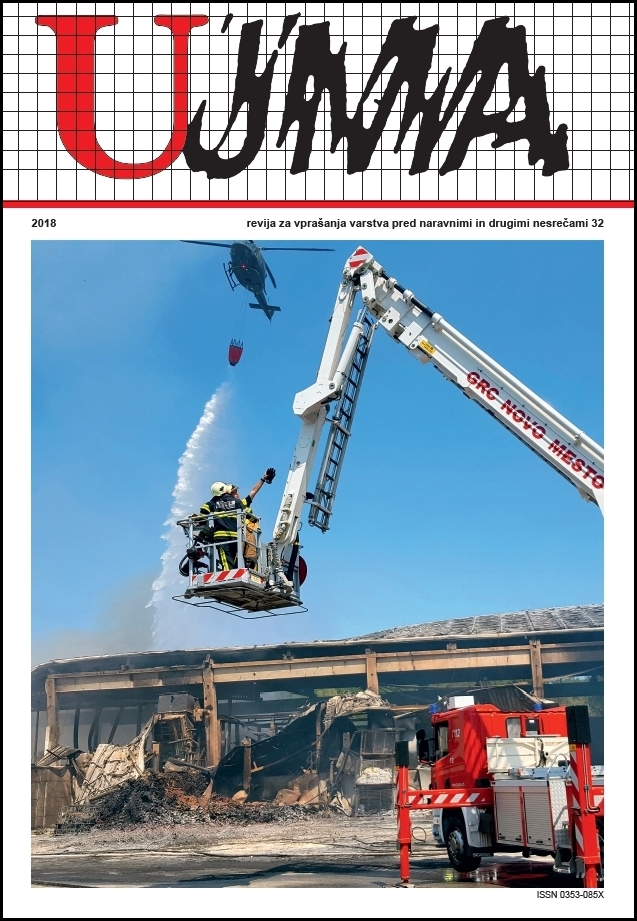INDUCED SEISMICITY
Abstract
Induced seismicity is caused by human activity which alters the stresses in the Earth's crust. The most dangerous can be large artificial lakes behind river dams, the extraction and injection of water in the process of the exploitation of hydrocarbons, and classic mining in deep mines. Excess extraction of fresh and thermal water, oil and gas, or mining in large open pit mines can sometimes have a disproportionately large influence on seismicity. In Slovenia only seismicity induced by classic coal mining is presently known; however, the monitoring of seismicity at large water dams is appropriately regulated and carried out.
References
Bajc, J., Živčić, M., Gostinčar, M., 2004. Seizmična aktivnost v Šaleški dolini spomladi 2002. Potresi v letu 2002. Agencija RS za okolje, 55–70.
Foulger, G. L., Wilson, M., Gluyas, J., Julian, B. R., Davies, R., 2017. Global review of human-induced earthquakes. Earth-Science Reviews, doi: 10.1016/j.earscirev.2017.07.008.
Gaite, B., Ugalde, A., Villaseñor, A., Blanch, E., 2016. Improving the location of induced earthquakes associated with an underground gas storage in the Gulf of Valencia. (Spain). Physics of the Earth and Planetary Interiors, 254, 46–59.
Godec, M., Vidrih, R., Sinčič, P., 2003. Opazovanje seizmičnosti na območju velikih pregrad. Ujma, 17–18, 208–217.
González, P. J., Tiampo, K. F., Palano, M., Cannavo, F., Fernandez, J., 2012. The 2011 Lorca earthquake slip distribution controlled by groundwater crustal unloading. Nature Geoscience, 5, 821–825.
Gosar, A., 2005. Možnost zmanjšanja učinka tople grede z geološkim skladiščenjem CO2 globoko pod Zemljinim površjem. Ujma, 19, 201–205.
Grandin, R., Vallee, M., Lacassin, R., 2017. Rupture process of the Oklahoma Mw 5.7 Pawnee earthquake from Sentinel-1 InSAR and seismological data. Seismol. Res. Lett., 88/4, 996–1004.
Guha, S. K., 2000. Induced Earthquakes. Kluwer Academic Publishers, 314 str., Dordrecht.
Joel, L., 2017. How to trigger a massive earthquake. EOS – Earth & Space Science News, 98/12, 4–5.
Kundu, B., Vissa, N. K., Gahalaut, V. K., 2015. Influence of anthropogenic groundwater unloading in Indo-Gangetic plains on the 25 April 2015 Mw 7.8 Gorkha, Nepal earthquake. Geophys. Res. Lett., 42, 10607–10613.
Mayer, J., Mavec, M., Zadnik, I., Lah, R., 2002. Spremljanje rudarsko induciranih seizmičnih pojavov v Premogovniku Velenje. Rudarsko-metalurški zbornik, 49/1, 51–60.
Medved, M., Dervarič, E., Vižintin, G., Likar, J., Mayer, J., 2008. Analysis of seismic events at the Velenje coal mine. RMZ – Materials and Geoenvironment, 55/4, 464–475.
Meier, P. M., Rodríguez, A. A., Bethmann, F., 2015. Lessons learned from Basel: New EGS projects in Switzerland using multistage stimulation and a probabilistic traffic light system for the reduction of seismic risk. Proceedings of World Geothermal Congress, 1–8, Melbourne.
Mendecki, A. J., 1997. Seismic monitoring in mines. Chapman and Hall, 262 str., London.
Terakawa, T., Miller, S. A., Deichmann, N., 2012. High fluid pressure and triggered earthquakes in the enhanced geothermal system in Basel, Switzerland. Journal of Geophysical Research – Solid Earth, 117.
Uradni list RS, 2003. Pravilnik o opazovanju seizmičnosti na območju velike pregrade. Uradni list RS, št. 92/99 in 44/03, Ljubljana.
Wikipedia, 2017. Induced seismicity. https://en.wikipedia.org/wiki/Induced_seismicity
Yeats, R. S., Sieh, K., Allen, C. R.1997. The geology of earthquakes. Oxford University Press, 568 str., Oxford.
Yeck,W. L., Hayes, G. P., McNamara, D. E., Rubinstein, J. L., Barnhart, W. D., Earle, P. S., Benz, H. M., 2016. Oklahoma experiences largest earthquake during ongoing regional wastewater injection hazard mitigation efforts. Geophys. Res. Lett., 44, 711–717.
Živec, T., 2005. Analiza potresne dejavnosti na območju Premogovnika Velenje. Diplomsko delo, Naravoslovnotehniška fakulteta, 69 str., Ljubljana.
Downloads
Published
Issue
Section
License

This work is licensed under a Creative Commons Attribution-NonCommercial-NoDerivatives 4.0 International License.
The articles are made available to the public under Creative Commons Attribution-NonCommercial-NoDerivatives 4.0 International (CC BY-NC-ND 4.0).


